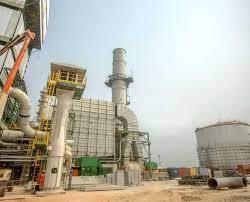Nigerian President Muhammadu Buhari inaugurated a $2.5 billion fertilizer facility on Tuesday, with the goal of contributing to global supplies amid the impact of rising prices in the aftermath of the Russia-Ukraine conflict.
“Nigeria’s reliance on imported agricultural products will soon be a thing of the past,” the Nigerian leader declared during the inauguration of the Dangote Fertilizer Plant in Lagos, the commercial city, along with other agricultural measures such as farmer incentives.
With the global fertilizer market thrown for a loop, Nigerian Central Bank Governor Godwin Emefiele said the plant’s opening is appropriate since it “has assisted Nigeria in solving a recurrent fertilizer problem.”
Agriculture is crucial to Nigeria’s economy, accounting for 25.8% of the country’s 72.3 trillion naira GDP in 2021. Farmers, on the other hand, are sometimes hampered by limited supplies of fertilizer and improved seedlings.
Nigeria expects “a boom” as a result of the new fertilizer factory, which has a capacity of 3 million metric tons per year, according to Buhari. “Fertilizer is now readily available in greater amounts and better quality,” he said.
He encouraged many Nigerians to “now take up agriculture as a business,” saying, “We foresee the development of a new generation of agropreneurs who will add value to farming and make the nation self-sufficient in food production.”
Fertilizer from the plant, which is located in an industrial zone in Lagos, will be exported to a number of countries, including the United States, Brazil, India, and Mexico, according to Aliko Dangote, Africa’s richest man, and the plant’s owner, amid supply disruptions caused by Russia’s ongoing war with Ukraine.
High fertilizer costs are already threatening farmers around the world, as a result of sanctions on Russia, a major global fertilizer exporter, where officials advised domestic producers to temporarily suspend exports in March.
“The new plant will make Nigeria self-sufficient in fertilizer production, with excess capacity to export to other African markets and the rest of the world,” Dangote said, adding that the plant will also “dramatically reduce unemployment” in the country, which currently has a 33 percent unemployment rate as of December 2020.
“Our goal is to ensure better agricultural output by making fertilizer available in sufficient quantity and quality for our teeming farmers,” Dangote stated of the fertilizer plant’s activities.




















